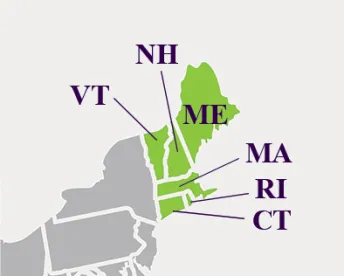Last updated March 31, 2021: Please note that location-based exemptions change often and without notice, so please be sure to check the listing for the states you plan to include in your travels. Some states are aggressively enforcing travel restrictions, and it is important to check both state and local requirements of your departure point and destination, as well as states you may be transiting, prior to travel.
In response to the ongoing COVID-19 pandemic, states have instituted requirements or other guidance for travelers from out of state. However, as new cases decline, some states have begun to roll back or repeal their quarantine requirements for visitors, relying instead on recommendations. A summary for each state in New England is outlined below. Our state-by-state overview of business and social restrictions more generally throughout New England is available here.
Both the federal government and the states have the authority to impose quarantines and travel restrictions to protect the health, safety, and welfare of residents. While the authorities vary from state to state, violating such orders is generally a misdemeanor criminal offense. We note that the Department of Homeland Security has announced another extension of its limitation on travel between Canada and the U.S. at ports of entry along the U.S.-Canada border, permitting only essential travel through April 21, 2021. Similarly, Canada continues to restrict entry into Canada from the U.S. to essential travel and immediate family members of Canadian citizens and permanent residents.
The CDC’s guidance on what to consider before traveling within the United States during the pandemic includes the following: whether you are traveling to a hotspot, whether where you live or your destination requires quarantine after traveling, and determining whether you live with someone who is vulnerable. We note that effective January 26, the CDC now requires a negative COVID test or documentation of recovery from COVID-19 for all air passengers arriving to the U.S . from a foreign country. Additional information is available here.
Following the White House executive order regarding mask-wearing during transit, effective February 1, the CDC also now requires all passengers and operators to wear face coverings while using all methods of public transportation, with limited exemptions. The order requires masks while waiting, boarding, and traveling on planes, trains, subways, buses, taxis, and other public modes of transportation, and requires operators to use best efforts to ensure compliance with the order, including denial of service or requiring the passenger to disembark at the earliest safe opportunity if they fail to comply. The order also permits carriers and operators to impose additional requirements for greater public health protection. While the order includes the possibility of criminal penalties, the CDC aims to rely on voluntary compliance, with civil penalties more likely for noncompliance. However, state and local authorities may enforce the measures in addition to federal authorities.
CONNECTICUT
As of March 19, 2021, Connecticut’s travel and quarantine requirements from Order 9S are no longer in effect. While there are no longer and mandates or requirements, it is recommended that residents and visitors to the state follow travel-related guidance from CDC and the state’s Department of Public Health. All international travelers coming to the state must still have a negative COVID-19 test result or documentation of recovery from COVID-19 before they board a flight to the United States.
MAINE
The Moving Maine Forward plan requires all travelers to Maine, including returning residents, to quarantine for 10 days unless one of the following exemptions applies:
- Travelers with a negative COVID-19 test: must be from a specimen taken no longer than 72 hours prior to arrival in Maine, or if taken upon arrival to the state, the visitor must quarantine while awaiting the results. A list of test sites is available here.
- Travelers are from New England (New Hampshire, Vermont, Massachusetts, Connecticut, and Rhode Island)
- People who either have had COVID-19 in the previous 90 days or are fully vaccinated against COVID-19
Essential workers are also exempt from testing and quarantine requirements if they are traveling to Maine to perform essential work, or are from Maine and are traveling out of state for essential work and returning home. Maine aims to lift all domestic travel restrictions by May 1 unless otherwise determined by the Maine CDC.
Travelers who are not residents of Maine or exempted states will be asked to sign a Certificate of Compliance or use the Pledge to Protect ME online tool to demonstrate compliance with the travel and quarantine requirements. This compliance form must be provided to check in at all Maine lodging, campgrounds, seasonal rentals, overnight camps, and other commercial lodging, such as Airbnb. Visitors may be asked to furnish proof of the negative test result upon request. Our detailed discussion of these requirements is available here.
Enforcement of the state’s travel restrictions is pursuant to 37-B M.R.S. §786(1), which permits violators to be charged with a Class E crime that includes punishment of up to six months in jail, a $1,000 fine, and the payment of civil damages to the state for its costs associated with testing, investigating, contact tracing, and otherwise determining the extent of COVID-19 transmission.
MASSACHUSETTS
Effective March 22, Order 66 repealed mandatory quarantine and testing requirements. However, visitors to Massachusetts, including returning residents, are advised to quarantine for 10 days upon their arrival. The following visitors are exempt from the advisory:
- Travelers with a negative COVID-19 test: must be from a specimen taken no longer than 72 hours prior to arrival in Massachusetts, or if taken upon arrival to the state, the visitor must quarantine while awaiting the results
- Anyone who is entering Massachusetts for fewer than 24 hours or who has left the state for less than 24 hours
- Workers who enter Massachusetts to perform critical infrastructure functions (per Cybersecurity and Infrastructure Security Agency) during required commuting to or from work and while at work
- Travelers who are fully vaccinated and who do not have symptoms
Travelers are encouraged to consult and follow the CDC guidelines and requirements for travel, including for international travel.
NEW HAMPSHIRE
On March 11, Governor Sununu announced that the state is now only recommending testing or quarantine for travelers entering New Hampshire from outside of New England, but that it is no longer required. However, the requirement is still in place for travels coming from other countries.
RHODE ISLAND
Rhode Island requires a 10 day quarantine for international travelers and for domestic cross-border travel for non-work-related purpose from states with high community spread and states with a COVID-19 positivity rate over 5%. As of this update, states considered hotspots include Alabama, Florida, Georgia, Idaho, Michigan, New Hampshire, New Jersey, North Carolina, Ohio, Pennsylvania, Tennessee, Texas, Utah, and Virginia, among others. International travelers are recommended to take their COVID test on day five of quarantine or later; a negative result shortens the required quarantine to seven days.
However, travelers from hotspots, as an alternative to quarantine, may provide proof of a negative test for COVID-19 taken within 72 hours prior to arrival in Rhode Island. Visitors must quarantine while waiting for test results, and may only end the quarantine if a negative result is obtained. Upon arrival, visitors subject to these requirements must complete a certificate of compliance and an out-of-state travel screening form. Additional travel tips are available here. Travelers who have tested positive or recovered for COVID within the past 90 days and have completed their isolation periods do not require a negative test or quarantine prior to entering unless symptomatic. Travelers who were fully vaccinated at least 2 weeks prior to travel are also exempt.
These self-quarantine and testing requirements do not apply to those traveling for work, to public health, public safety or healthcare workers, people traveling for medical treatment, court hearings, to attend funeral or memorial services, to obtain necessities such as groceries, gas, or medication, to drop off or pick up children from care, or to anyone who must work on their boats. Quarantine guidance for those in close contact with someone with COVID-19 is available here.
VERMONT
Vermont has a mandatory quarantine for anyone returning or traveling to Vermont. Residents returning to the state must complete either 14-day quarantine or a seven-day quarantine followed by a negative COVID-19 test. All students returning home from a college or university, in-state or out-of-state, must either (1) quarantine at home for 14 days, with a test for COVID-19 strongly encouraged, or (2) quarantine for a minimum of seven days followed by a negative COVID-19 test.
Non-resident travelers entering Vermont in a personal vehicle must complete either (1) a 14-day quarantine or (2) a seven-day quarantine followed by a negative test in their home state and enter Vermont without further quarantine restrictions. Travelers arriving to Vermont who have not completed a pre-arrival quarantine (i.e. those traveling via public transportation or from further than a direct car ride) may complete either (1) a 14-day quarantine or (2) a seven-day quarantine followed by a negative test in a Vermont lodging establishment or with friends and family, although travelers must stay in their quarantine location for the duration of quarantine other than to travel to and from a test site. Guidance for lodging operators, including guest compliance with the travel requirements, is available here. Note that as part of Vermont’s suspension on social gatherings between households, travelers may not gather with another household in the state even after completing a quarantine.
All previous exemptions to quarantine requirements still apply, including those for people traveling for essential purposes. Essential travel includes travel for personal safety, medical care, care of others, parental shared custody, for food, beverage or medicine, to perform work for businesses that are currently allowed to operate, or to attend pre K-12 school and college if commuting daily. However, the current state of emergency requires employers to use remote work and telework whenever possible, and cautions businesses and employees to only travel for work-related trips when absolutely necessary. Individuals engaged in a daily commute to and from their place of employment are also exempt from quarantine requirement.




 />i
/>i

